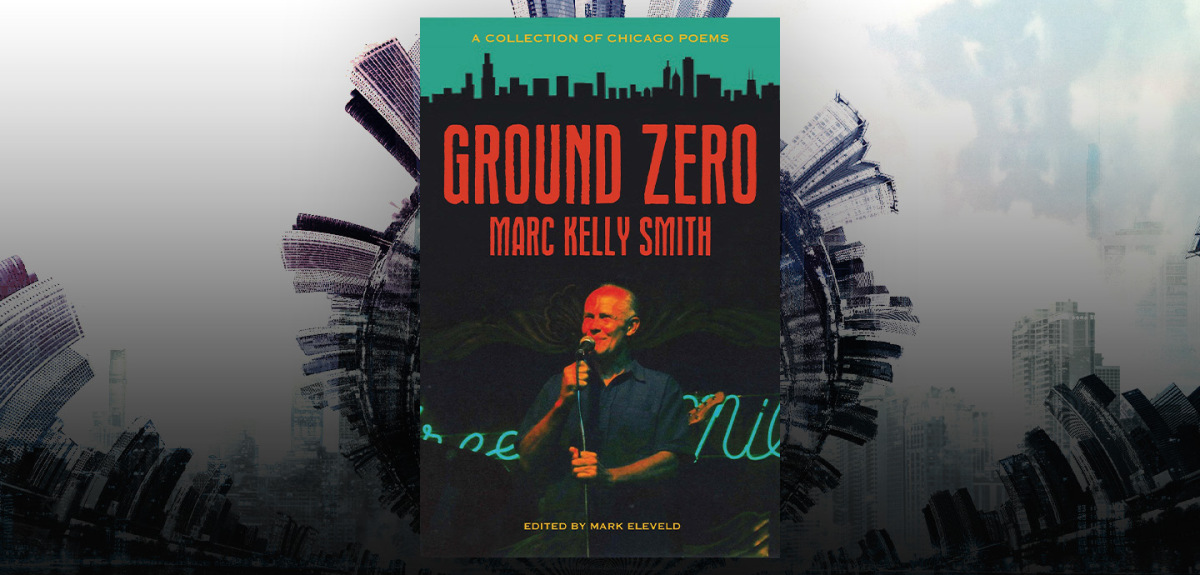[ad_1]
Marc Kelly Smith, nicknamed “Slam Papi,” founded international slam poetry in the 1980s when he started the monumental Uptown Poetry Slam series at the Green Mill. Each Sunday night, he attracted misfits and poets from across Chicago and its suburbs to exchange words, including the likes of Gwendolyn Brooks and Patricia Smith, who provides a compelling introduction to Smith’s new collection of Chicago poems, Ground Zero, edited by Mark Eleveld.
Smith is known for his gritty, vibrant language and theatrical performances that have excited and inspired writers for decades. A former construction worker, Smith could always level with the miscreants that he found on Broadway in Chicago’s Uptown neighborhood, and acted as a role model for many aspiring artists.
As Patricia Smith writes in the introduction, “Marc was just enough of all of us—a heartbroken souse, madly in love with lyric and leaving shards of his self-esteem on beer-slick floors.” She says he helped show “what poetry can be if the unwashed, untrained, and underfunded get ahold of it.”Ground Zero provides a glimpse of what Smith does in front of a crowd. The words jump off the page. From “Uptown Monologue”:
When you’re down and out
Raise your head high
And shout,
OH SHIT!
The Peanuts! refrain in “Ballpark Poem” inserts itself between each stanza, recreating the familiar sounds of Chicago’s streets on any baseball gameday.
Still, much of Smith’s verse is straightforward and anti-full-of-itself. “Old men crying. Nothing more pathetic. Nothing more real,” he writes in “Cockren,” a poem about a man Smith met “in the utility room of the First Presbyterian Church on west Addison,” who comes to realize how much he loves his grown son in a heavy metal band.
Or in “My Father’s Coat”:
I’m wearing my father’s coat.
He has died. I didn’t like him.
But I wear the coat.
Smith seems to recognize that, especially on the Chicago streets, and especially in the wee hours, everyone’s looking for something, even if they don’t know what it is. (That idea alone may aptly describe the beginnings of slam poetry too.) In “IT: The Solution” he writes:
If you need to kiss it,
Kiss it.
If you need to kick it,
Kick it.
If you need to scream it.
Scream it.
But kiss it, kick it, scream it
Now.
Smith started a movement that is still poignant and wildly popular around the world. He knew how to take the written word and adapt it to be less snooty, perhaps less academic, so that lovers of jazz and booze and street smarts could relate, right alongside the traditionalist poets.
In these Chicago-focused poems, Smith riffs about everyday Chicagoans, rich Chicagoans, and Chicagoans who roam the streets at night looking for feelings of home and new feelings to forget home. In “Deep-Dish Chicago,” he begins:
Chicago: the deep-dish city of deep-dish people
Everybody’s juices bubblin’ & sizzlin’ & spittin’ inside.
Smith gave that festering a place to shine, to become tangible and recognizable. Where all voices were heard and accepted, where people could simply be themselves. Patricia Smith writes: “It was the most beautiful thing I had ever seen.”
Ground Zero is a stunning, ferocious collection of some of Smith’s best work about the city where it all started.

POETRY
Ground Zero
By Marc Kelly Smith
Edited by Mark Eleveld
TriQuarterly Books
Published October 15, 2020
[ad_2]
Source link
